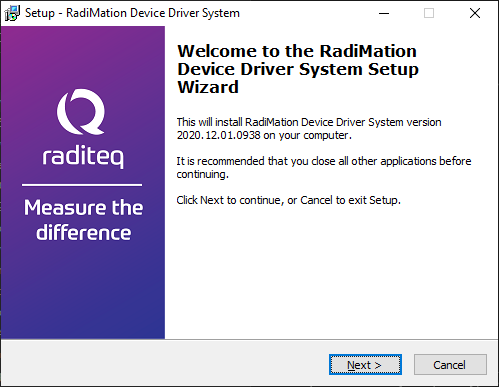DRIVERS.EXE: Difference between revisions
No edit summary |
|||
| (One intermediate revision by the same user not shown) | |||
| Line 5: | Line 5: | ||
Only one {{RadiMation}} version can be updated at a time. If multiple versions of {{RadiMation}} installations should be updated, the DRIVERS.EXE program should be started multiple times. | Only one {{RadiMation}} version can be updated at a time. If multiple versions of {{RadiMation}} installations should be updated, the DRIVERS.EXE program should be started multiple times. | ||
A detailed explanation of how the drivers can be installed is described in [[RadiMation Application Note 117| RadiMation Application Note 117: Updating RadiMation device drivers]]. | |||
= Version = | = Version = | ||
| Line 18: | Line 20: | ||
[[Image:DriversExeStartPage.PNG]] | [[Image:DriversExeStartPage.PNG]] | ||
The version of this example is: | The version of this example is: 2020, Dec, 01 on 09:38 AM. | ||
[[Category:RadiMation]] | [[Category:RadiMation]] | ||
Latest revision as of 10:56, 21 February 2022
DRIVERS.EXE is an installation program that installs updated device drivers for RadiMation®. This program will only install device drivers, the setup program for RadiMation® is available from this page.
When the DRIVERS.EXE is started, a small check for installed RadiMation® versions is done. The end-user is then presented with a list, where he can select the RadiMation® version for which the device drivers should be updated.
Only one RadiMation® version can be updated at a time. If multiple versions of RadiMation® installations should be updated, the DRIVERS.EXE program should be started multiple times.
A detailed explanation of how the drivers can be installed is described in RadiMation Application Note 117: Updating RadiMation device drivers.
Version
The version of DRIVERS.EXE is a time stamp which describes the date and time on which the device drivers are compiled. This date and time stamp can be used to determine different revisions of the device drivers.
The time stamp is encoded like:
YYYY.MM.DD.HHmm
which is <Year> <Month> <Day>, <Hour>:<Minute>
Example
The version of this example is: 2020, Dec, 01 on 09:38 AM.
